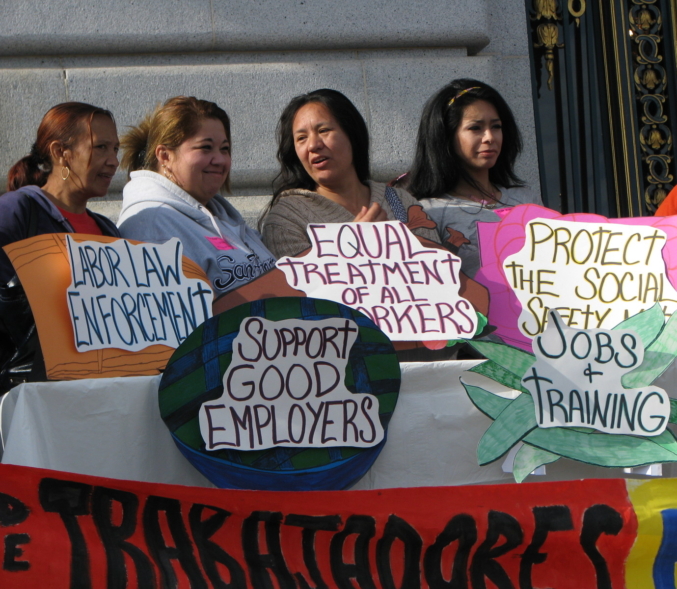Fight Workplace Discrimination in All Its Forms
Your race, ethnicity, nationality, gender, sexual orientation, age, conviction record, family or immigration status, or disability should not limit your job opportunities.


Let’s Uproot Workplace Discrimination
In a good-jobs economy, your current and future employment prospects are not determined by your race, ethnicity, gender, sexual orientation, age, disability, conviction record, or family or immigration status.
Because of your inherent worth, you’re afforded the opportunity to acquire the education, skills, relationships, and experience to achieve a lifetime of employment mobility, rewarding work, and economic security.

Discrimination is Still Far Too Common
Workers of color—particularly Black workers and women of color—have historically been undervalued and discriminated against at work. Employment discrimination reflects deep-rooted prejudices and structural inequalities in society. As a result of occupational segregation, workers of color are disproportionately channeled into the most dangerous and underpaid jobs.
Even 60 years after the Civil Rights Act of 1964 and the creation of the Equal Employment Opportunity Commission (EEOC), recent studies show a majority of Black workers and high percentages of other workers of color, as well as women and LBGTQ+ workers, report having experienced discrimination in hiring.
How Pervasive is Hiring Discrimination?
Substantial shares of Black, Latinx, Native American, Asian-American, LGBTQ+, and women workers report experiencing discrimination when applying for jobs.
of Black workers say they've faced hiring discrimination.
of Latinx workers say they’ve faced hiring discrimination.
of Asian-American workers say they've faced hiring discrimination.
of Native American workers say they've faced hiring discrimination.
of women workers say they've faced hiring discrimination.
of LGBTQ+ workers say they've faced hiring discrimination.
What is Occupational Segregation?
Occupational segregation is the systemic overrepresentation or underrepresentation of a demographic group in a particular occupation or field of employment.
Explore MoreLet’s Dismantle Discrimination and Occupational Segregation
To build a good-jobs economy where everyone can thrive, we must dismantle discriminatory practices and occupational segregation. Far too many Black and Latinx workers, women, immigrant workers, people with disabilities, and formerly incarcerated people are trapped in jobs that don’t pay well, have the fewest benefits, and offer the least opportunity to advance.
We must remove structural barriers to mobility so that all workers have equal opportunity to get better jobs. We must ensure that every job pays a living wage, has robust benefits, and enables workers to have a say in shaping the rules they work by.
To uproot discrimination and occupational segregation, federal, state, and local policymakers must advance the following policies:
- Ensure that anti-discrimination and civil rights laws are vigorously enforced by defending and restoring critical agencies such as the EEOC and the Office of Federal Contractor Compliance Programs and by increasing funding for and staffing at state and local fair employment practices agencies.
- Prohibit employers from paying workers differently based on gender, race, or ethnicity when they perform substantially the same work; mandate pay transparency; and ban employers from asking about salary history.
- Revisit the use of audit testing (also known as matched-pair testing) by federal, state, and local fair employment practices agencies to identify hiring discrimination, promote employment opportunities, and advance racial equity. See NELP’s report on audit testing.
- Regulate artificial intelligence and “bossware” to limit how algorithms perpetuate discrimination in hiring and career advancement. See NELP’s report on digital surveillance and automated decision systems.
- End independent contractor misclassification to ensure that workers are covered by fundamental legal protections against discrimination. See NELP’s work on worker misclassification.
- Curtail the use of arrest and conviction records and personal credit histories in hiring, firing, and promotions. See NELP’s work on fair chance employment.
- Adopt “clean slate” policies that automatically seal arrest and conviction records under certain circumstances, preventing discrimination based on justice-involved status. See resources on clean slate policies.
- Expand fundamental worker protections, including the Fair Labor Standards Act and Occupational Health and Safety Act, to include incarcerated workers and workers re-entering communities. See NELP’s work on building power for criminalized workers.
- Ensure immigrant workers benefit from full worker protections and are shielded from retaliation. See NELP’s work on immigrant workers.
Related Resources
MLK’s Dream vs. Trump-Era Policies: Advancing Workers’ Rights in 2025

Blog
Trump Abandons Six Decades of Progress on Workplace Discrimination Protections for Federal Contractors

News Release
Desegregating Opportunity: Why Uprooting Occupational Segregation is Critical to Building A Good-Jobs Economy

Report